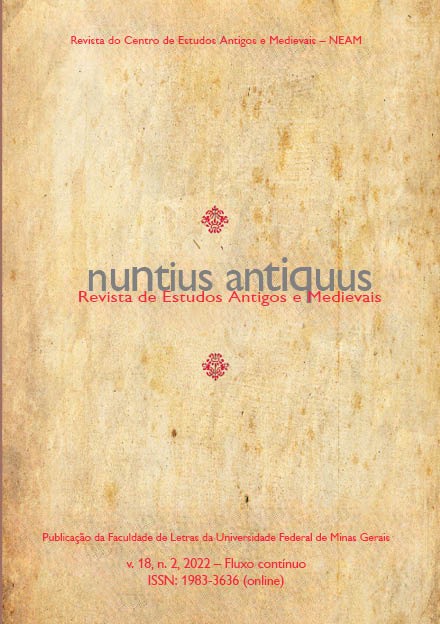A arte de reformular os mitos
Ivo de Castro Oliveira, A família de Electra
Mots-clés :
Atridas, Labdácidas, Ésquilo, Eurípides, Zambrano, morte/vida, Labdacids, Aeschylus, death/lifeRésumé
Resumo: É propósito desta reflexão analisar a versão inovadora do mito de Electra concebida por Ivo de Castro Oliveira, tendo em conta as linhas de força das tradições envolvidas. A combinação é exótica, articulando dois dos mitos mais populares na Antiguidade: o dos Atridas e o dos Labdácidas. Uma avaliação atenta das personagens e dos papéis que lhes são atribuídos justifica o título: a figura de Electra é central, como polo de articulação de todas as outras tensões, mas são sobretudo as conexões familiares que importam. Novas estratégias dramáticas (como a flutuação do tempo dramático, determinante na estrutura da peça) merecem atenção pelo contributo que dão à reformulação de velhos motivos. Fatores de contexto, próprios de finais do séc. XX, marcam igualmente e de forma original este regresso ao tema ‘Atridas’. E assim se vai construindo o diagrama de uma recriação que tem tudo para ser inovadora sem, paradoxalmente, desfigurar as fontes a que recorre.
Palavras-chave: Atridas; Labdácidas; Ésquilo; Eurípides; Zambrano; morte/vida.
Abstract: The purpose of this reflection is to analyse the innovative version of the myth of Electra conceived by Ivo de Castro Oliveira, taking into account the traditions involved. The combination is exotic, articulating two of the most popular myths in Antiquity: that of the Atreids and that of the Labdacids. A careful evaluation of the characters and roles attributed to them justifies the title: the figure of Electra is central, as the articulating pole of the other tensions, but it is above all the family connections that matter. New dramatic strategies (such as the fluctuation of dramatic time, a determining factor in the structure of the play) deserve attention for their contribution to the reformulation of old motifs. Context factors, typical of the end of the 20th century, also mark this return to the ‘Atreids’ theme in an original way. And so the diagram of a recreation that has everything to be innovative is built, without, paradoxically, disfiguring the sources to which it resorts.
Keywords: Atreids; Labdacids; Aeschylus; Euripides; Zambrano; death/life.
Téléchargements
Références
BOAS, Evert van Emde. Language and character in Euripides’ Electra. Oxford: Oxford University Press, 2017.
BONNARD, André. Iphigénie à Aulis: Tragique et poésie. Museum Helveticum, Basel, v. 2, n. 2, p. 87-107, 1945.
DEVEREUX, George. Dreams in Greek tragedy. Oxford: Oxford University Press, 1975.
FOLEY, Helene P. Female acts in Greek tragedy. Princeton: Princeton University Press, 2003.
GAGARIN, Michael. Aeschylean drama. Berkeley: University of California Press, 1976.
HALL, Edith. Why Greek tragedy in the Late Twentieth Century? In: HALL, Edith; MACINTOSH, Fiona; WRIGLEY, Amanda (org.). Dionysus since 69: Greek Tragedy at the Dawn of the Third Millennium. Oxford: Oxford University Press, 2004, p. 1-40.
HARDWICK, Lorna. Voices of trauma: Remaking Aeschylus’ Agamemnon in the Twentieth Century. In: CONSTANTINIDIS, Stratos E. (org.). The reception of Aeschylus’ Plays through Shifting Models and Frontiers. Leiden and Boston: Brill: 2007, p. 280-303.
IAKOV, Daniel. Fragmenting the self: Society and psychology in Euripides’ Electra and Ion. In: MARKANTONATOS, Andreas; ZIMMERMANN, Bernhard (org.). Crisis on stage: Tragedy and Comedy in Late Fifth-Century Athens. Berlin/New York: De Gruyter, 2012, p. 121-138.
LESKY, Albin. Decision and responsibility in the tragedy of Aeschylus. In: SEGAL, Erich (org.).Greek tragedy. Oxford: Oxford University Press, 1991 [1966], p. 13-23.
LÉVY, Edmond. Le théâtre et le rêve: le rêve dans le théâtre d’Eschyle. In: LÉVY, Edmond. Théâtre et spectacles dans l’Antiquité. Leiden: Brill, 1983, p. 141-168.
MOREAU, Alain. La Clytemnestre d’Eschyle. Cahiers du Gita, Montpellier, n. 8, p. 153-171, 1994-1995.
MOSSMAN, Judith. Women’s speech in Greek tragedy: The case of Electra and Clytemnestra in Euripides’ Electra. Classical Quarterly, Cambridge, v. 51, p. 374-384, 2001.
Téléchargements
Publiée
Numéro
Rubrique
Licence
(c) Copyright Maria de Fátima Silva (Autor) 2023

Ce travail est disponible sous la licence Creative Commons Attribution 4.0 International .










